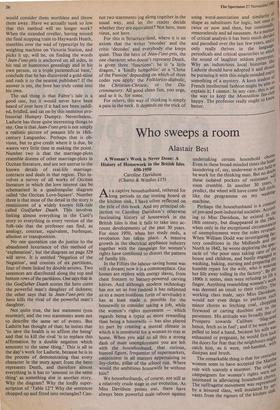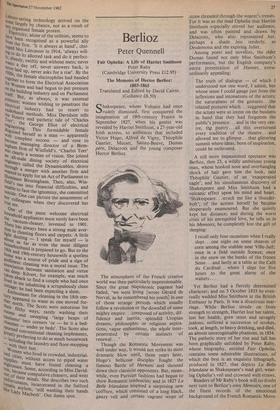Who sweeps a room
Alastair Best
A Woman's Work is Never Done: A History of Housework in the British Isles 650-1950 Caroline Davidson (Chatto & Windus £15) As a captive househusband, tethered for long periods to the ironing board or the kitchen sink, I have often reflected on the title of this book. And my principal ob- jection to Caroline Davidson's otherwise fascinating history of housework in the British Isles is that it fails to take into ac- count developments of the past 30 years. For since 1950, when her study ends, a revolution has taken place. A massive growth in the electrical appliance industry together with the campaign for women's rights have combined to distort the pattern of family life.
In the Fifties the labour-saving home was still a dream; now it is a commonplace. Our homes are replete with energy slaves, from chest freezers to battery-powered carving knives. And although modern technology has not set us free (indeed it has subjected us to a more insidious form of servitude) it has at least made it possible for the housewife to consider taking a job, while the women's rights movement — which regards being a typist as more rewarding than being a housewife — has also played its part by creating a mental climate in which it is unnatural for a woman to stay at home. When you add to all this a strong dash of male unemployment you are left with the househusband, that curious, hunted figure, frequenter of supermarkets, ominiscient in all matters appertaining to Jey-cloths, pillar of the school run. Where would the ambitious housewife be without him?
We househusbands, of course, are still at a relatively crude stage in our evolution. As Miss Davidson points out, there have always been powerful male taboos against
undertaking certain household chord, Even in these broad-minded times the hal.;ffi laundering of, say, underwear is not hew k`-t be work for the thinking man. But no doli these isolated pockets of resistance soon crumble. In another 30 years' predict, the wheel will have come full circle,
like the programme on my machine.
Perhaps the househusband is a creatur,e, o. f pre-and post-industrial societies. Accorue ing to Miss Davidson, he existed in t,h 18th century, but disappeared in the 19tue; when only in the exceptional circumstanced of unemployment were the roles revers„, When William Dodd was investigating '",:e washing" conditions in the Midlands and the North in 1842, he wrote deploring the sPe.ce tacle of 'the poor men taking care of U1.11 house and children, and busily engaged washing, baking, nursing and preparing !rig humble repast for the wife, who is the her life away toiling in the factorY'• a 1890s it seems, men were refusing t° finger. Anything resembling women's work was deemed an insult to their virility. The was class male, says Miss Davids1 would not even deign to perform sn.c minor chores as fetching coal, choPPInhbe firewood or carting dustbins out to t pavement. His attitude was broadly that 00:1 Prospero towards Caliban: `Hag S hence, fetch us in fuel'; and if he were ec; pelled to lend a hand, because his vvife,WA exhausted or pregnant, he would first the doors for fear that the neighbours 11.011 catch him, as it were, red-handed, wit dustpan and brush. The remarkable thing is that for centurihe: women seem to have accepted the Mar` ,1 role with scarcely a murmur. The orlgin"t campaigners for women's rights were 11_ interested in alleviating household chores,; The suffragette movement was represente".1_ by a leisured class, well insulated bY .se," vants from the rigours of the kitchen sInr- Labour-saving technology arrived on the scene largely by chance, not as a result of any organised female protest. tlectricity, alone of the utilities, seems to ['cave been recognised as a powerful ally nom the first. 'It is always at hand', chir- raPed Mrs Lancaster in 1914, 'always will- 'ng to do its allotted task and do it perfect- 1Y, silently, swiftly and without mess; never wants a day off, never answers back, is never laid uP, never asks for a rise'. By the othe female electrophiles had banded ,tgether to form the Electrical Association tor Women and had begun to put pressure On the building industry and on Parliament itself. But as always, it was external Pressure; women wishing to penetrate lletrate the ectrical industry had to resort to underhand methods. Miss Davidson tells he bizarre and pathetic tale of 'Charles Inn°, the George Eliot of electrical engineering. This formidable female di.sgutsed herself as a man — apparently !Ith complete success — and rose. to 'ecome managing director of a Birm- ingharn firm of Winfield's. 'Charles T r,
an or was early a woman of vision. She joined .all-male dining society of electrical ,eagineers called the Dynamicables, drove Wanted
_
g" to a merger with another firm and apply for an Act of Parliament.to Irlluminate Birmingham. Then, alas, Win- liteld's ran into financial difficulties, .and 71.1,al3le to face the ignominy, she committed shuicide. One can picture the amazement of true colleagues when they discovered her .ue Sex b ()ne of the most welcome electrical i',(1usehold appliances must surely have been 5he vacuum-cleaner, invented in 1901. .here has always been a strong male aver- ?1',1 to cleaning floors and carpets. A little al)",Tht ,.dusting — I speak for myself — is h about g far as even the most diligent ir,ousehusband is prepared to go. But to the home and 19th-century housewife a spotless
godliness: was a source of pride and a sign of !Nihness: cleaning was a moral issue. The
rassociation between sanitation and virtue !,, deep. Kilvert, for example, was much ren.aback to find a couple who had once ,ved In sin inhabiting a scrupulously clean ,cittage: he had been expecting a slum. tuEnthusiasm for cleaning in the 18th cen- thrY aPPeared to wane as one moved fur- ther. north. The Scots were notorious for r eir 'fhY ways, rarely washing their ,.,°"'Is and sweeping 'large heaps of _",astmess' into corners 'or — be it a bed- cnamber — under ye beds'. The Scots also spurned conventional cleaning implements, greatly preferring to do as much housework including the laundry and floor-mopping with their feet. iseW, °tn. en who lived in crowded, industrial- su: 911es, without access to piped water h,",l_pues must have found cleaning . a s,;gutMare. Some, according to Miss David- 0„11,' became compulsive cleaners, and went
of their minds. She describes two such ,".'uortunates, incarcerated in the Salford like Lady Macbeth'. Out damn spot.











































 Previous page
Previous page